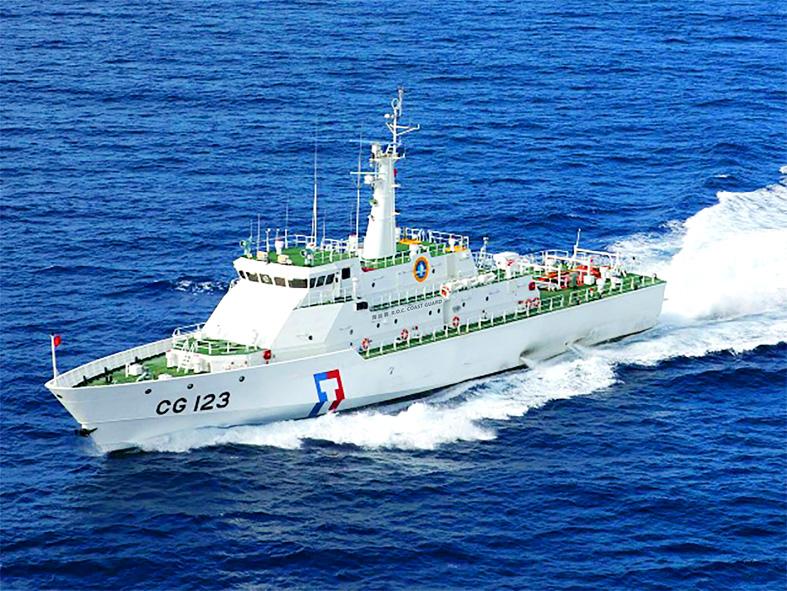The Ministry of National Defense has elaborated on the military’s countermeasures against China’s “gray-zone conflict” tactics in a comprehensive review of Taiwan’s defense strategy.
The ministry’s 2021 Quadrennial Defense Review, which was on Thursday delivered to the Legislative Yuan’s Foreign Affairs and National Defense Committee for review, highlights the Chinese People’s Liberation Army’s (PLA) increasing use of gray-zone conflict methods, including cognitive warfare, disinformation, and air and sea patrols.
The methods are employed by the PLA to exhaust Taiwan’s armed forces and morale, the ministry said.

Photo provided by the Coast Guard Administration via CNA
The PLA’s cognitive warfare strategy is based on the “three forms of warfare” concept, which refers to public opinion warfare, psychological warfare and legal warfare, which are conducted to create internal contradictions in Taiwan, the ministry said.
The ministry’s answer to cognitive warfare is the creation of rapid response mechanisms that use technology to counter disinformation, provide factual rebuttals across multiple media, stop public panic, and create counter-narratives with international partners, it said.
China has reorganized its forces to augment its cyberwarfare capabilities, and PLA cyberunits are deployed for intelligence gathering and for stealing military, industrial and commercial secrets, it said.
Another part of the PLA’s effort is directed toward identifying gaps in Taiwan’s cyberinfrastructure to exploit them, including attacking these targets during a war to paralyze the nation’s government, security forces and military, the ministry said.
The armed forces are to stop these threats by implementing information security mechanisms, increasing defensive capabilities and strengthening collaboration with cybersecurity agencies, it said.
The integration of military and civilian cybersecurity systems and the training of cybersecurity experts must be emphasized, the ministry added.
The PLA’s use of air and sea patrols to harass Taiwan is countered by the rapid deployment of reaction forces, the ministry said.
The military has made and will continue to make rolling adjustments to incident management protocols and the general combat readiness of the armed forces so that the military can anticipate and effectively respond to PLA actions, it said.
The command and control systems of the armed forces have facilitated intelligence sharing between Taiwan and its allies and the surveillance of enemy forces in the Taiwan Strait, and provided the nation with an early warning capability, it said.
In addition, the navy and the coast guard are committed to developing teamwork in peace and to redeploying coast guard vessels as naval assets in wartime in joint operations, it said.
The review is mandated by Article 31 of the National Defense Act (國防法), which states that the ministry must provide a review for the president within 10 months of inauguration.

‘DENIAL DEFENSE’: The US would increase its military presence with uncrewed ships, and submarines, while boosting defense in the Indo-Pacific, a Pete Hegseth memo said The US is reorienting its military strategy to focus primarily on deterring a potential Chinese invasion of Taiwan, a memo signed by US Secretary of Defense Pete Hegseth showed. The memo also called on Taiwan to increase its defense spending. The document, known as the “Interim National Defense Strategic Guidance,” was distributed this month and detailed the national defense plans of US President Donald Trump’s administration, an article in the Washington Post said on Saturday. It outlines how the US can prepare for a potential war with China and defend itself from threats in the “near abroad,” including Greenland and the Panama

A wild live dugong was found in Taiwan for the first time in 88 years, after it was accidentally caught by a fisher’s net on Tuesday in Yilan County’s Fenniaolin (粉鳥林). This is the first sighting of the species in Taiwan since 1937, having already been considered “extinct” in the country and considered as “vulnerable” by the International Union for Conservation of Nature. A fisher surnamed Chen (陳) went to Fenniaolin to collect the fish in his netting, but instead caught a 3m long, 500kg dugong. The fisher released the animal back into the wild, not realizing it was an endangered species at

The High Prosecutors’ Office yesterday withdrew an appeal against the acquittal of a former bank manager 22 years after his death, marking Taiwan’s first instance of prosecutors rendering posthumous justice to a wrongfully convicted defendant. Chu Ching-en (諸慶恩) — formerly a manager at the Taipei branch of BNP Paribas — was in 1999 accused by Weng Mao-chung (翁茂鍾), then-president of Chia Her Industrial Co, of forging a request for a fixed deposit of US$10 million by I-Hwa Industrial Co, a subsidiary of Chia Her, which was used as collateral. Chu was ruled not guilty in the first trial, but was found guilty

The Chinese Nationalist Party (KMT) is maintaining close ties with Beijing, the Democratic Progressive Party (DPP) said yesterday, hours after a new round of Chinese military drills in the Taiwan Strait began. Political parties in a democracy have a responsibility to be loyal to the nation and defend its sovereignty, DPP spokesman Justin Wu (吳崢) told a news conference in Taipei. His comments came hours after Beijing announced via Chinese state media that the Chinese People’s Liberation Army’s Eastern Theater Command was holding large-scale drills simulating a multi-pronged attack on Taiwan. Contrary to the KMT’s claims that it is staunchly anti-communist, KMT Deputy